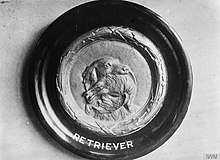HMS Retriever (1917)
HMS Retriever was an R-class destroyer which served with the Royal Navy.
_IWM_SP_1410.jpg) Sister ship HMS Taurus | |
| History | |
|---|---|
| Name: | Retriever |
| Ordered: | July 1915 |
| Builder: | Thornycroft |
| Launched: | 15 January 1917 |
| Decommissioned: | 26 July 1927 |
| Fate: | Sold, 21 April 1928 |
| General characteristics | |
| Class and type: | R-class destroyer |
| Displacement: | 1,034 long tons (1,051 t) standard 1,208 long tons (1,227 t) full |
| Length: | 274 ft (83.5 m) |
| Beam: | 27 ft 6 in (8.4 m) |
| Draught: | 11 ft (3.4 m) |
| Propulsion: |
|
| Speed: | 36 knots (41 mph; 67 km/h) |
| Range: | 3,450 nautical miles (6,390 km) at 20 knots (37 km/h) |
| Complement: | 82 |
| Armament: |
|
Design
Retriever was one of three R-class destroyers ordered by the British Admiralty from Thornycroft in July 1915 as part of the Sixth War Construction Programme.
Retriever had a long overall of 274 feet (84 m), with a beam of 27 feet 6 inches (8.38 m) and a draught of 11 feet (3.4 m). Displacement was 1,034 long tons (1,051 t) normal and 1,208 long tons (1,227 t) full load.[1] Three Yarrow boilers fed steam to two sets of Brown-Curtis geared steam turbines rated at 27,000 shaft horsepower (20,000 kW) and driving two shafts, giving a design speed of 36 knots (67 km/h; 41 mph). Three funnels were fitted. 296 tons of oil were carried, giving a design range of 3,450 nautical miles (6,390 km; 3,970 mi) at 20 knots (37 km/h; 23 mph).[2]
Armament consisted of three QF 4in Mk IV guns on the ship's centreline, with one on the forecastle, one aft on a raised bandstand and one between the second and third funnels. A single 2-pounder (40 mm) pom-pom anti-aircraft gun was carried, along with four 21 in (533 mm) torpedoes in two twin rotating mounts. Fire control included a single Dumaresq and a Vickers range clock. The vessel had a complement of 82 officers and ratings.[1]
Service
Retriever was laid down in January 1916 and launched on 15 January 1917.[1] On commissioning in March 1917, the ship joined the Harwich Force, serving as part of the Tenth Destroyer Flotilla until the end of the war.[3][4] The ship was credited with the destruction of UB-54 with depth charges on 12 March 1918 with Sturgeon and Thruster.[5] Placed into reserve after the Armistice, the destroyer was sold for breaking up in July 1927.

Pennant numbers
| Pennant Number | Date |
|---|---|
| F64 | 1917[6] |
| F58 | 1918[6] |
References
- Gardiner, Robert; Gray, Randal, eds. (1985). Conway's All the World's Fighting Ships 1906–1921. London: Conway Maritime Press. p. 81. ISBN 0-85177-245-5.
- Friedman, Norman (2009). British Destroyers: From Earliest Days to the First World War. Barnsley, UK: Seaforth Publishing. p. 310. ISBN 978-1-84832-049-9.
- "Harwich Force". Supplement to the Navy List Showing Organisation of the Fleet, Flag Officers' Commands &c.: 13. July 1917.
- "Harwich Force". Supplement to the Navy List Showing Organisation of the Fleet, Flag Officers' Commands &c.: 13. October 1918.
- Messimer, Dwight R. (2002). Verschollen: World War I U-boat Losses. Annapolis: Naval Institute Press. p. 173. ISBN 9781557504753.
- Dittmar, F.J.; Colledge, J.J. (1972). British Warships 1914–1919. Shepperton: Ian Allan. p. 71. ISBN 0-7110-0380-7.